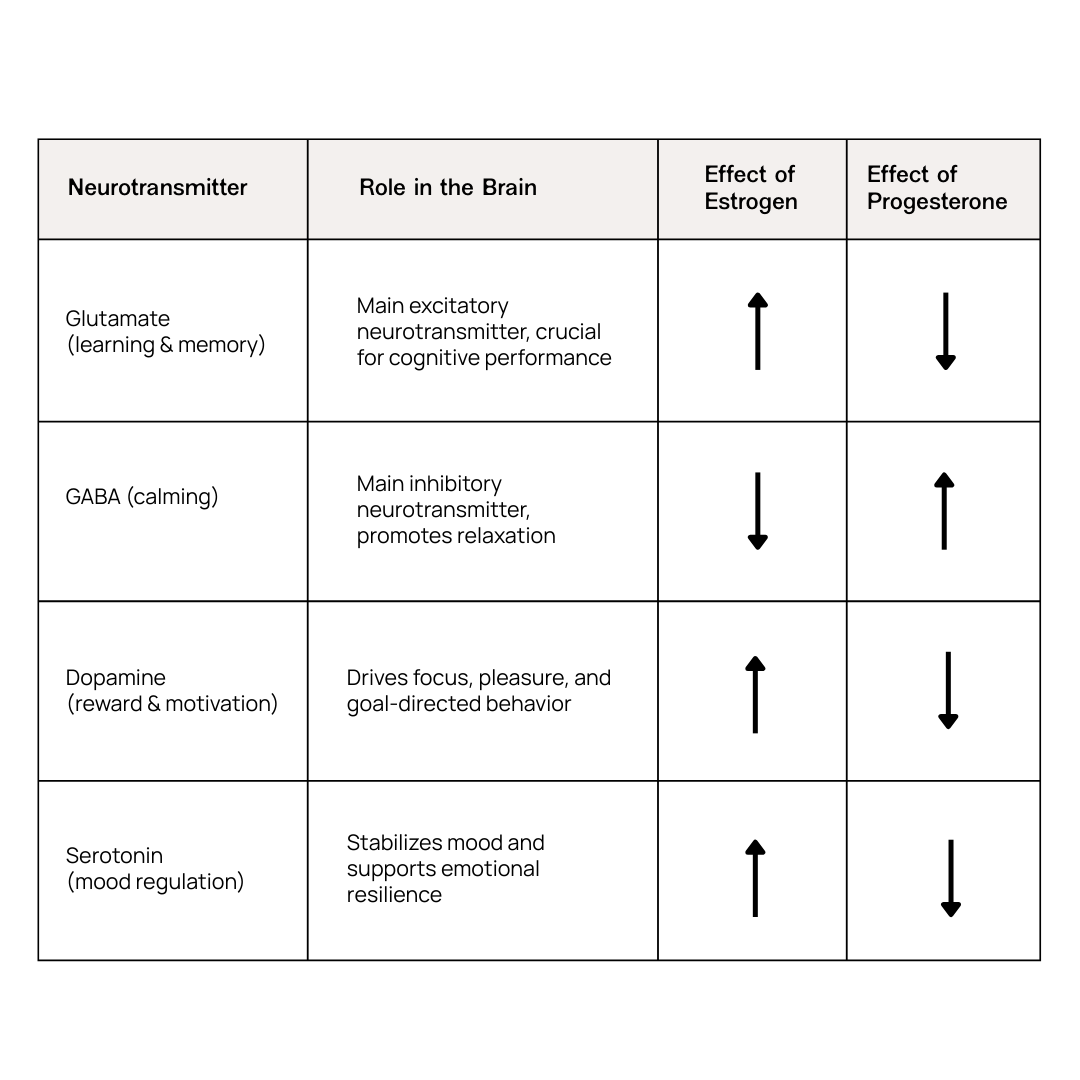
Neuroscience
•
2025-08-02
What are neurotransmitters, and why are they important for women’s health?
By Kate Ferguson, Chief of Staff at Samphire Neuroscience
When people talk about women’s health, they usually start with hormones. Estrogen, progesterone, testosterone - the usual suspects. But if we stop there, we miss the real control center: the brain.
The brain doesn’t just respond to hormones - it controls them. Your brain tells your ovaries when to release estrogen, your adrenal glands when to release cortisol, and your pituitary gland when to start the entire hormonal cascade. And it does this while speaking its own language: neurotransmitters - the chemical messengers that decide how you feel, think, focus, and respond to pain.
If hormones are the signals sent to the brain, neurotransmitters are how the brain processes and interprets those signals and sends instructions back to the body. It’s a constant two-way conversation - and if that conversation gets disrupted, you feel it.
For me, understanding neurotransmitters was a turning point. It helped me connect the dots between why I sometimes felt unstoppable mid-cycle and why, at other times, I could barely drag myself out of bed. Once you know what’s happening in your brain chemistry, you can stop blaming yourself for “just not coping” - and start working with your brain instead of against it.
What Are Neurotransmitters?
Neurotransmitters are chemicals that allow your brain cells (neurons) to communicate. Every thought, emotion, and movement starts as an electrical signal in a neuron. But to cross from one neuron to another, that signal has to jump a gap - the synapse - and it does that by releasing neurotransmitters.
Some of the most important for women’s health are:
- Glutamate - the main “go” signal, essential for learning and memory.
- GABA - the brain’s calming brake pedal, preventing overload.
- Dopamine - drives motivation, focus, and the sense of reward.
- Serotonin - supports mood stability, emotional resilience, and even sleep.
These chemicals are always in motion - and they’re not static from one week to the next. They ebb and flow with your menstrual cycle.
How hormones shape - and are shaped by - brain chemistry
Your cycle isn’t just a hormonal rhythm - it’s also a neurotransmitter rhythm. Hormones like estrogen and progesterone can boost or reduce the activity of certain brain chemicals. But those hormones are themselves regulated by the brain through the hypothalamic-pituitary-gonadal (HPG) axis.
From our Cycle-Brain Guide, where you can find an in depth look at the neuroscience of the menstrual cycle:

In practice:
- High estrogen (follicular phase to ovulation) can make you sharper, more motivated, and more optimistic - but sometimes at the expense of feeling calm.
- High progesterone (luteal phase - after ovulation, to menstruation) can make you calmer, but sometimes less focused, less motivated, and more vulnerable to low mood.
If you’ve ever wondered why one week you feel like the CEO of your life and the next you’re ready to burn it all down - this is part of the reason.
When neurotransmitter balance breaks down
Most of the time, your brain rides this hormonal-neurotransmitter wave without too much trouble. But in certain conditions, the system gets disrupted - and that’s when symptoms become chronic and/or severe.
- Premenstrual Syndrome (PMS) & Premenstrual Dysphoric Disorder (PMDD) - In PMDD, your brain can become less responsive to GABA’s calming effects and more sensitive to serotonin dips, leading to intense mood swings, anxiety, and irritability. (We explore this in our blog on how neuroimaging could transform PMDD diagnosis).
- Primary Dysmenorrhea (period pain) - Estrogen fluctuations can alter serotonin, dopamine, and norepinephrine systems that regulate pain - meaning your pain threshold can drop dramatically right before your period.
- Endometriosis - Chronic pain changes the brain. Research shows altered glutamate and GABA activity in pain and emotion centers, making the brain hypersensitive to pain signals (read the neuroscience of endometriosis).
- Perimenopause - As estrogen declines, serotonin and dopamine networks shift, increasing the risk of low mood, brain fog, and cognitive changes (see our deep dive on the neuroscience of perimenopause).
Working with your brain - not against it
This is where brain-based tools come in. We build solutions that work with your brain’s chemistry, not just your hormones.
- Nettle™ - A clinically validated, drug- and hormone-free wearable that uses gentle brain stimulation to target mood and pain-processing areas. In clinical trials, Nettle™ has been shown to improve emotional regulation and raise the pain threshold - likely by helping rebalance neurotransmitter activity.
- Samphire - A neuroscience-based active diary that helps you spot patterns in mood, focus, and energy across your cycle, so you can predict and prepare for shifts in brain chemistry rather than being blindsided by them.
We also know the brain can adapt. Through neuroplasticity, your brain can rewire itself over time - and brain stimulation is like a training program that helps it do exactly that (read our perspective on neuroplasticity and the cycle). As we’ve just explained, neurotransmitters are the missing link between your hormones and your lived experience. Because your brain also controls your hormones, understanding neurotransmitters means understanding your entire cycle. When you see it as a brain cycle too, everything clicks - and you can work with it, not against it.
References
Sheffler, Z.M., Reddy, V. and Pillarisetty, L.S. (2025) ‘Physiology, Neurotransmitters’, in StatPearls. Treasure Island (FL): StatPearls Publishing. (Accessed: 14 August 2025).

